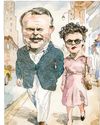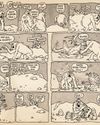
Ever since I was a child, I have been E drawn to dance because it expresses emotions and bodily impulses without words. Once, when I was a young dancer, standing in the wings and nervous that my mind was blank, a senior colleague told me not to worry. "It's when the words come that you're finished," she said. "They destroy everything." Words are now my trade, but I still harbor a dancer's suspicion of them, and this is perhaps one reason that I have been reluctant to embrace the recent trend toward dances that tell stories or make statements. I appreciate classics like "Swan Lake," pure dance stitched into a story with pantomime and gesture, but I experience them as music and dance; to this day I can't quite remember the plots. And recent ballet adaptations of novels including "Of Love and Rage," "Jane Eyre," and "Like Water for Chocolate" have left me unmoved, struggling to find some connection between plot and steps, rather than absorbing dance as a language in and of itself.
The British choreographer Wayne McGregor's "Woolf Works," a triptych inspired by Virginia Woolf that was recently given its U.S. première by American Ballet Theatre, seemed to promise something different. For one thing, Woolf's move away from conventional plot, the way that she folds readers into sensual experience and into the wandering nature of our memories and inner lives, has some affinities with the inchoate and associative character of dance.
And although McGregor has chosen three specific novels-"Mrs. Dalloway," "Orlando," and "The Waves"-he is not trying to literally act them out; rather, he is making a kind of dance analogue of Woolf's vision and her prose.
Denne historien er fra July 22, 2024-utgaven av The New Yorker.
Start din 7-dagers gratis prøveperiode på Magzter GOLD for å få tilgang til tusenvis av utvalgte premiumhistorier og 9000+ magasiner og aviser.
Allerede abonnent ? Logg på
Denne historien er fra July 22, 2024-utgaven av The New Yorker.
Start din 7-dagers gratis prøveperiode på Magzter GOLD for å få tilgang til tusenvis av utvalgte premiumhistorier og 9000+ magasiner og aviser.
Allerede abonnent? Logg på

SUBJECT AND OBJECT
What happened when Lillian Ross profiled Ernest Hemingway.

ROYAL FLUSH
The fall of red.

Roz Chast on George Booth's Cartoons
There's almost nothing I like more than a laughing fit. It is a non-brain response, like an orgasm or a sneeze.

CHUKA
I have always longed to be known, truly known, by another human being. Sometimes we live for years with yearnings that we cannot name.

Rachel Aviv on Janet Malcolm's "Trouble in the Archives"
As Janet Malcolm worked on \"Trouble in the Archives,\" a two-part piece about prominent psychoanalysts who disagreed about Freud, she began a correspondence with Kurt Eissler, the head of the Sigmund Freud Archives.

PERSONAL HISTORY - A VISIT TO MADAM BEDI
I was estranged from my own mother, so a friend tried to lend me his.

AMERICAN CHRONICLES - WAR OF WORDS
Editors, writers, and the making of a magazine.

LIVE FROM NEW YORK
A new docuseries commemorates fifty years of \"Saturday Night Live.\"

TANGLED WEB
An arachnophobe pays homage to the spider.

TROUBLE IN PARADISE
Mike White's mischievous morality plays.